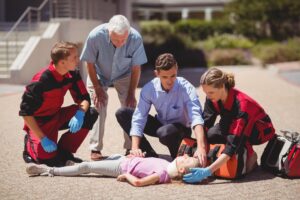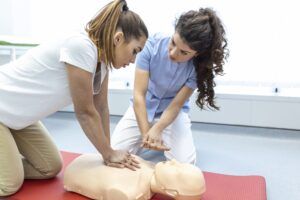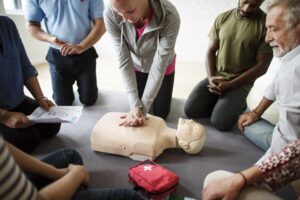Getting CPR certified means learning how to save lives in emergencies when someone’s heart suddenly stops beating. It’s important for everyone to know because it helps increase the chances of someone surviving. CPR training teaches skills like rescue breathing and chest compressions, which can keep a person alive until professional help arrives.
Additionally, being CPR-certified makes people more confident and prepared to help in tough situations. It’s not just for doctors or nurses; anyone can learn it. Many Australians now complete accredited CPR Training in Sydney so they’re confident during emergencies. By getting certified, people become part of a community that’s ready to act and make their neighbourhoods safer.
In today’s blog, we’ll talk about the nine big benefits of getting CPR certified. It doesn’t matter if you’re a parent, a student, or working in healthcare, this training can help you make a real difference.
Table of Contents
ToggleUnderstanding CPR and CPR Certification
CPR is an emergency procedure used on individuals who are experiencing cardiac arrest or severe breathing difficulties. It involves chest compressions and artificial ventilation to circulate oxygen until medical help arrives. Many CPR classes also include hands-on practice using AEDs, which you’ll learn during an accredited First Aid Course.
What is CPR?
CPR is an emergency procedure used on individuals who are experiencing cardiac arrest or severe breathing difficulties. It involves chest compressions and artificial ventilation to circulate oxygen until medical help arrives. Many CPR classes also include hands-on practice using AEDs, which you’ll learn during an accredited First Aid Course.
CPR Technique
Standard CPR involves a 30:2 ratio of compressions to breaths, with compressions at 100–120 per minute and at least 5 cm deep.
CPR Certification Training
CPR certification courses teach you:
- How to recognise cardiac arrest
- How to perform compressions + rescue breaths
- How to use an AED
- How to respond to breathing emergencies
If you’re in Sydney, you can enrol in a nationally recognised CPR Certification Course to gain these skills.
How CPR Certification can be Beneficial for You
1. CPR Saves Life
During emergencies, every second matters. CPR certification prepares you to assist immediately when someone collapses. At home, work, or in public, knowing CPR could save a loved one or a stranger.
Many security guards and frontline workers pair CPR with the Security Guard Course because the two skills complement each other.
2. CPR Training Available for Everyone
Anyone—children, students, workers, or seniors—can get CPR certified. Training is available both in-person and online. After completing the training and assessments, you earn a certification valid for two years.
Online CPR certification is convenient, interactive, and includes simulations that help build real-world confidence.
3. Providing Hope and Calmness in Emergencies
People with CPR training can stay calm and take control during stressful situations. Your presence can reassure victims and their families, providing stability until paramedics arrive.
4. Meeting Job Requirements with CPR Certification
CPR certification can advance your career. It’s required or preferred in jobs such as:
- Security guards
- Childcare providers
- Flight attendants
- Fitness trainers
- Aged care workers
- Hospitality & events staff
If you’re starting a career as a security guard, CPR is often required before enrolling in the NSW Security Licence Course.
5. Helping Victims of Choking and Drowning
CPR training also prepares you for choking emergencies and drowning situations. Knowing when to use abdominal thrusts, rescue breaths, or full CPR can save lives.
6. Rescue Breathing for Asthma Attacks
CPR training includes rescue-breathing techniques that are useful during:
- Severe asthma attacks
- Drug overdose
- Smoke inhalation
- Carbon monoxide poisoning
Learning how to check airways and breathe for someone properly can prevent complications.
7. Providing Aid in Accidents and Natural Disasters
CPR-certified individuals are valuable during accidents, trauma situations, earthquakes, floods, and other disasters.
Many training programs, including Multisec’s First Aid Training in Sydney, cover AED use and essential first aid skills for emergencies.
8. Preventing Brain Death During Cardiac Arrest
Brain cells begin to die within minutes of oxygen loss. CPR helps maintain oxygen flow, preventing permanent brain injury and increasing survival chances.
9. Learn how to use an AED
CPR certification teaches you how to use an Automated External Defibrillator (AED). These devices analyse heart rhythms and can restart the heart with a shock.
Learning AED use ensures you can act quickly and effectively when cardiac arrest occurs.
Also Read
Here are two helpful guides to continue your learning:
✔ Difference Between CPR and First Aid Training
✔ Mastering Life-Saving Skills: A Comprehensive Guide to CPR Training
Conclusion
Acquiring CPR certification is about learning life-saving skills that can protect loved ones, colleagues, and strangers during emergencies. From calling emergency services to performing hands-only CPR, your actions can determine whether a victim survives.
Keeping your skills updated is essential. At Multisec Training, we offer nationally accredited CPR Courses in Sydney designed to boost your confidence and prepare you for real emergencies.





